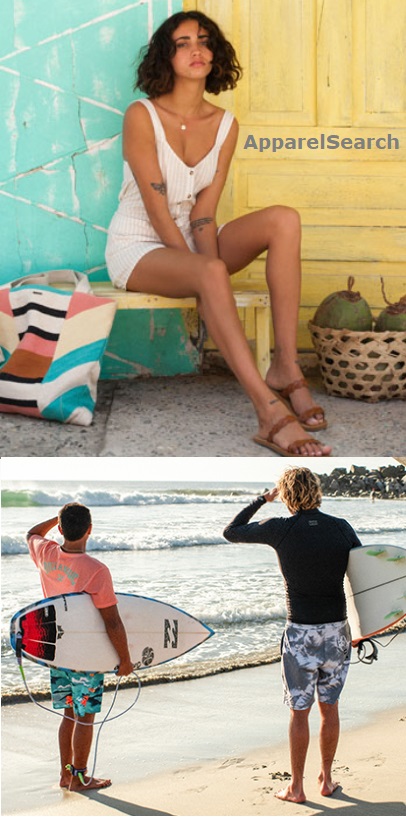Billabong is a lifestyle brand sports wear and casual clothing manufacturer.
Billabong International Limited's core business is the marketing, distribution, wholesaling and retailing of apparel, accessories, eyewear, wetsuits and hardgoods in the boardsports sector under the Billabong, RVCA, Element, Von Zipper, Honolua Surf Company, Kustom, Palmers Surf, Xcel, Sector 9 and Tigerlilly brands.
Billabong International's products are licensed and distributed in more than 100 countries and are available in approximately 10,000 doors worldwide. Products are distributed through specialized boardsports retailers and through the company's own branded retail outlets. The majority of revenue is generated through wholly-owned operations in Australia, North America, Europe, Japan, New Zealand, South Africa and Brazil.
 The Company's brands are marketed and promoted
internationally through association with high profile professional
athletes, junior athletes and special events.
The Company's brands are marketed and promoted
internationally through association with high profile professional
athletes, junior athletes and special events.
Billabong was founded on Australia's Gold Coast in 1973 by surfer and surfboard shaper Gordon Merchant and his then partner, Rena. In the early days of the company the two partners were designing boardshorts at home, cutting them out on the kitchen table and then carting the finished product around to the local surf shop to sell. The business found immediate traction, with surfers drawn to the superior functionality of the Billabong boardshorts. They were also far more durable courtesy of the unique triple-stitching technique developed by Gordon.
-
If you are planning to develop your own lifestyle fashion brand, you may want to learn more about stitches & seams here on Apparel Search.
The next step for the fledgling brand was to introduce the better local surfers to Billabong and incorporate them in the marketing of the brand. Company-sponsored contests and special events would later follow. By the 1980s, Billabong had firmly established its place in Australian surf culture and was ready for international expansion. The initial focus was on the large North American market and, again, the brand enjoyed success.
Sales began to grow in other offshore markets, licenses were granted in a number of territories including New Zealand, Japan and South Africa, and in the late 1980s a new beachhead was established in Europe.
Through the 1990s the surf industry grew exponentially and professional surfing gained a newfound respectability. The company also followed its core customers into other boardsports markets, including skate, snow and wake, where it replicated its proven business model. By the close of the decade, Billabong had been restructured to capitalize on the growing global opportunities in the boardsports sector.
The restructure set the foundation for an initial public offering in Australia in mid-2000. The move saw the company's shares publicly listed on the Australian Securities Exchange in August 2000. This gave the company greater impetus and the financial capacity to grow the business.
Some seven months after the public float the company demonstrated its growth plans with the acquisitions of the Von Zipper sunglasses brand and, four months later, the emerging Element Skateboards brand. The successful integration of those businesses saw the company add to its stable of brands in following years, with Honolua Surf Company acquired in January 2004, Kustom footwear and Palmers Surf in September 2004, a controlling interest in the beachculture airport-retail business in November 2005 (later converted to 100% ownership) and Nixon watches and accessories in January 2006. Other businesses were also established, including the Element footwear range and various branded retail stores around the world.
In 2007 the Group continued to build its brand portfolio with the acquisitions of the specialist wetsuit brand Xcel and girls swimwear brand Tigerlily. This was followed in 2008 with the acquisition of the Sector 9 skateboard brand and the DaKine premium boardsport accessories brand.
In late 2009 the Company formally entered the online sales channel through the acquisition of US-based boardsport retailer Swell.com and the purchase of an interest in Australia's Surfstitch.com. In March 2010 the Company enhanced its skate offer through the signing of an agreement to license the California-based Plan B skateboard brand. This was followed in July 2010 by the acquisition of the California-based RVCA brand, the completion in September of the acquisition of the West 49 retail chain in Canada and the completion of the acquisitions of Australia's Jetty Surf, Surf Dive 'n' Ski (SDS) and Rush retail banners in November.
In February 2014 Billabong completed the sale of its West 49 retail chain in Canada.
In September 2014 Billabong completed the sale of its 51% stake in SurfStitch and its 100% ownership of Swell to a consortium of investors including SurfStitch founders Justin Cameron and Lex Pedersen allowing the Company to narrow its strategic focus, invest in building its mono-brand ecommerce and omni-channel businesses and pursue its strategic vision.
In the opinion of Apparel Search, after Billabong went public, they went on an ill-advised buying spree. Apparently in 2014 they got the hint and started making attempts to consolidate a bit.
More information to follow soon.
Thank you for using the Apparel Search website.